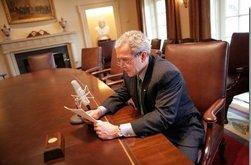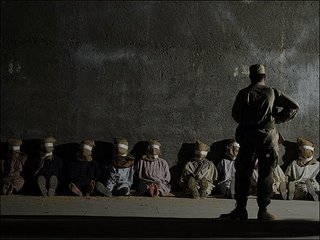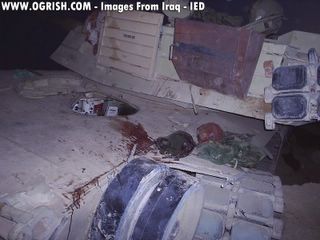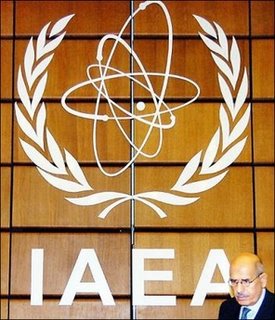President Bush's Radio Address to the Nation for June 17

To: National Desk
Contact: White House Press Office, 202-456-2580
WASHINGTON, June 17 /U.S. Newswire/ --Following is the text of President Bush's radio address to the nation today:
THE PRESIDENT: Good morning. Earlier this week, I traveled to Baghdad to visit the capital of a free and democratic Iraq. It was an incredible feeling to stand in the cockpit of Air Force One and watch the pilot steer us in toward Baghdad.
After we landed, I had the pleasure of meeting with our dedicated embassy staff and intelligence officers serving far from home under dangerous circumstances. And I was honored to meet with some of our troops, including those responsible for bringing justice to the terrorist Zarqawi. It was a privilege to shake their hands, look them in the eye, and tell them how much the American people appreciate their daily courage, and how much we appreciate the sacrifices that they and their families are making.
On my trip, I also met with the new Iraqi Prime Minister Maliki, and I was able to see firsthand his strong character and his determination to succeed. We held a joint meeting of our two Cabinets, with members of my Cabinet participating by video teleconference from Camp David. The Prime Minister briefed us on his plan to take immediate steps in three key areas: improving security, building up Iraq's economy so Iraqis can see real progress in their lives, and reaching out to the international community to secure support for Iraq's new government. Then we discussed how my administration can help the Prime Minister accomplish these vital objectives.
His top priority is securing Baghdad, so Coalition and Iraqi forces have launched Operation Together Forward, a joint effort to restore security and the rule of law to high-risk areas of the city. To help the Prime Minister improve security, we will continue embedding Coalition transition teams in Iraqi army and police units, and we will help the new Iraqi Ministers of Defense and Interior improve their command and control, root out corruption, and investigate and punish human rights violations. We will also support the Prime Minister as he works to rein in illegal militias, build a judicial system that will provide equal justice to all, and promote reconciliation among the Iraqi people.
To aid the Prime Minister in revitalizing Iraq's economy, we will send additional experts to help the Iraqi government develop an economic framework that will promote job creation and opportunity for all Iraqis. We will also help the Prime Minister increase oil and electricity production by working together on ways to protect key infrastructure from attacks, and to quickly restore oil and electricity production when attacks do occur.
Finally, America will help the Prime Minister engage the international community in Iraq's success. We will encourage other nations to fulfill the monetary pledges they have already made to help the new Iraqi government succeed. We will also support the Prime Minister's efforts to forge a new international compact. Under this compact, Iraq will take a series of steps in the political, economic, and security areas, and in return, the international community will provide Iraq with more robust political and economic support.
During my trip, I was impressed with the Prime Minister, the team he has assembled, and the plan he has set for his government. I appreciate his determination, and the determination of his Cabinet, to make his agenda work. I told them that the future of Iraq is in their hands. And I told them that America is a nation that keeps its word, and America will stand with them as we work toward our shared goal: a free Iraq that can govern itself, sustain itself, and defend itself. By seizing this moment of opportunity, we will defeat our common enemies and build a lasting democracy in the heart of the Middle East, and that will make Americans, Iraqis, and the world more secure.
I traveled to Baghdad to personally show our Nation's commitment to a free Iraq, because it is vital for the Iraqi people to know with certainty that America will not abandon them after we have come this far. The challenges that remain in Iraq are serious. We face determined enemies who remain intent on killing the innocent, and defeating these enemies will require more sacrifice and the continued patience of our country. But our efforts in Iraq are well worth it, the mission is necessary for the security of our country, and we will succeed.
Thank you for listening.
END
http://www.usnewswire.com











































